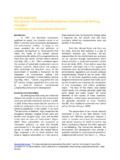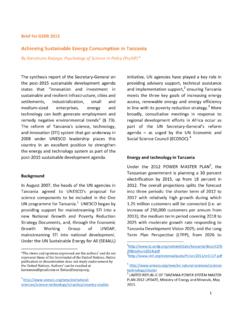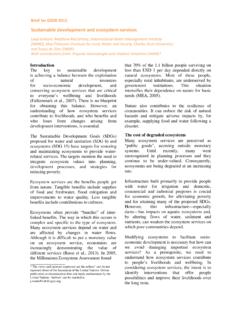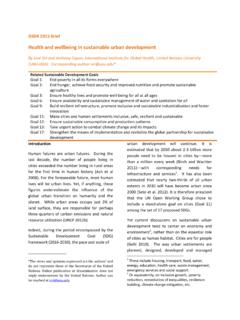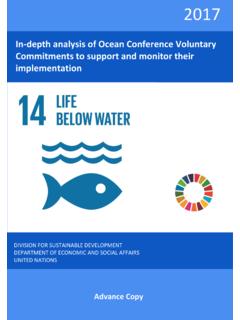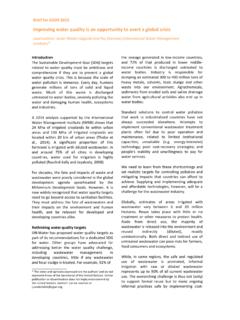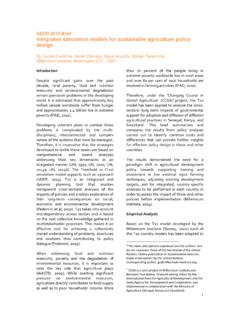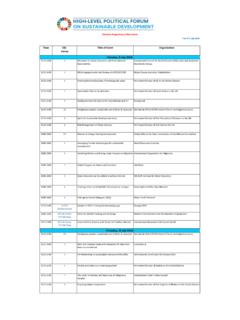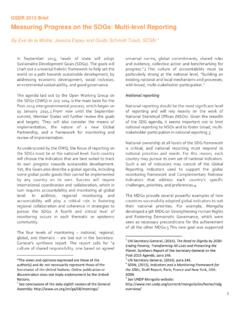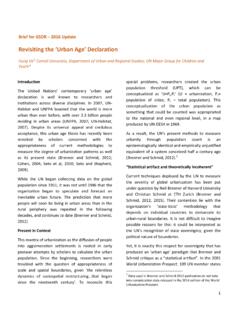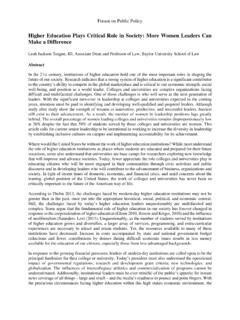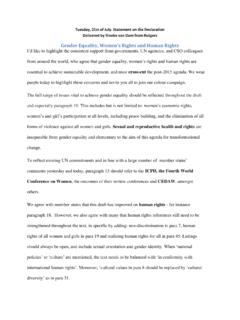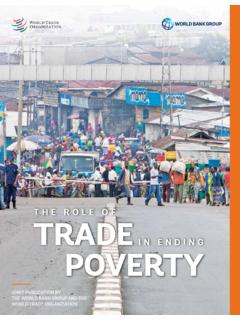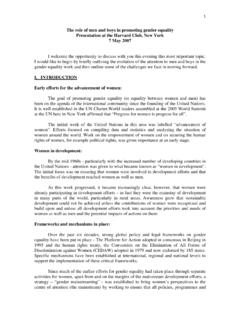Transcription of 1. Micro-, Small and Medium Enterprises (MSMEs) and their ...
1 1 Policy Brief: the Role of Micro- Small and Medium Enterprises in Achieving SDGs Prepared by Clark Ke Liu 1. Micro-, Small and Medium Enterprises (MSMEs) and their potential contributions to SDGs While there still lacks a universally accepted definition, Micro-, Small and Medium Enterprises (MSMEs) are widely recognized for the important contributions they make to sustainable development, in terms of contributions to economic growth, creation of decent jobs, provision of public goods and services, as well as poverty alleviation and reduced inequality. MSMEs comprise a major share of total private sector entities in both developed and developing countries.
2 According to a recent research by OECD,1 MSMEs contributed to 53% and 86% of employment in OECD countries such as the UK and Greece in 2017. In developing countries such as Peru, 98% of private Enterprises are MSMEs, contributing to 42% of GDP and accounting for 60% of employment. Likewise, MSMEs provide about 50% and 80% of employment in Cambodia and Kenya. The critical contribution of MSMEs to broader social economic objectives, including job creation makes them a key priority area for achieving the Sustainable Development Goals (SDGs). Job creation through MSMEs will often directly benefit the poor and vulnerable, particularly women and youth, thereby directly reducing poverty, increasing income and positively impacting on household investments in education and health over time.
3 MSME development has the potential for wide reaching impacts on the SDGs globally, including SDG 1 (end poverty), SDG 2 (zero hunger), SDG 3 (good health and well-being), SDG 5 (gender equality), SDG 8 (promote inclusive and sustainable economic growth, employment and decent work), and SDG 9 (improve sustainable industrialization and fostering innovation). 2. MSMEs Growth: Opportunities and Challenges The world has seen increased growth in MSMEs following the 2008 financial crisis. While not yet having returned to pre-crisis levels, recent data from an OECD and World Bank survey suggests growth in MSMEs in countries such as the UK, France and Sweden, which reflects positively on job creation.
4 For instance, about half of MSMEs surveyed 1 Unlock the potential of SMEs for the SDGs. (2017). 2 expect to increase employment in the short-term, especially for those created in less than three Comparatively, there is, however, less empirical evidence on MSMEs growth in developing and emerging economies countries. Nonetheless a joint study of the OECD and the World Bank on inclusive global value chains indicates that growth of MSMEs in developing and Least Developed Countries (LDC) dominate in sectors which are labor-intensive and possess low barriers to entry, including agriculture and agribusiness, manufacturing and service sector.
5 In addition, many MSMEs in developing countries are still informally organized Enterprises . It is also worth noting that the increased harnessing of knowledge-based capital, which is seen in MSMEs among middle-income and emerging economies countries. Combined with the fragmentation of global value chains, knowledge-based capital could allow MSMEs from emerging economy countries to build their niche in international markets, which would lead to generation of additional added value. Nonetheless, MSMEs, especially those in developing countries and LDCs, face substantive challenges, which limit their longevity and wider contributions they make toward the SDGs.
6 Such challenges are relevant in the case of MSMEs in middle-income and emerging economies as well. Specifically, these challenges could include: - Coherent policy and regulatory frameworks Coherent regulatory frameworks can provide an enabling environment to foster MSME development. Barriers to entry, including technical regulations, compliance with Environment, Health and Safety (EHS) standards, labor laws and regulations, and likewise taxation and financial reporting need to be addressed. Coherent regulatory frameworks can substantially reduce transaction costs for MSMEs. Lack of transparency and overly burdensome regulatory requirements can hinder the growth of informal MSMEs into formal business entities, further impacting on the potentials of MSMEs to positively contribute to local economic development.
7 - Access to finance Short term cash flow constraints and limited access to finance is almost a universal challenge for MSMEs. In the short term, the lack of liquidity can leave Enterprises unable to pay workers and suppliers or cover overheads and to forward plan and achieve scale in the Medium to long run. The current credit gap is estimated at US$ trillion for formal MSMEs, and US$ 6 trillion for informal MSMEs around the world. About 70% of MSMEs in emerging economies countries lack access to credit. With limited assets to use as collateral, formal and informal MSMEs are often 2 OECD.
8 (2016). Entrepreneurship at a Glance 2016. Paris: Author 3 perceived by commercial financing institutions as high-risk borrowers, which means higher costs in terms of fees and interest rates incurred. In recent years, many national governments and international organizations have tried to promote grant facilities, preferential rates and loan guarantee programmes to bridge the gap. Well-managed schemes need to provide support and capacity building to ensure Small business owners only take onboard acceptable amounts of risk and avoid bad debts. There continues to be great interest and new developments in venture capital, and other innovative and alternative financing for MSMEs.
9 - Imperfect information and capacity gaps Entrepreneurs and MSMEs suffer disproportionately from asymmetric information, including lack of market information. Many entrepreneurs and MSMEs also struggle to find the support needed to strengthen their business management, marketing, record and bookkeeping, strategic and financial planning, to be able to grow, formalize their business operations, capture market share and also cope with shocks. Lack of professional business management skills may further limit appreciation of MSME entrepreneurs on the value of research and development (R&D) and innovation in promoting productivity. This would eventually affect growth of MSMEs to a higher value knit along the global value chain.
10 - Access to basic infrastructure With their limited financial means, good basic infrastructure is important to MSME business operations. Access to a stable electricity supply, road networks, ports and airports, water supply, as well as ICT, and in particular, broadband internet, is important to fostering private sector development and reducing the challenges that MSMEs already face in growing their businesses. Access to ICT and digitalization can be very important to allow MSMEs to close and even leapfrog informational, capacity and finance gaps. - Entrepreneurship and Investing in Women Entrepreneurs Fostering the capacity of women entrepreneurs and business owners has a significant potential to reduce poverty and inequality globally.
